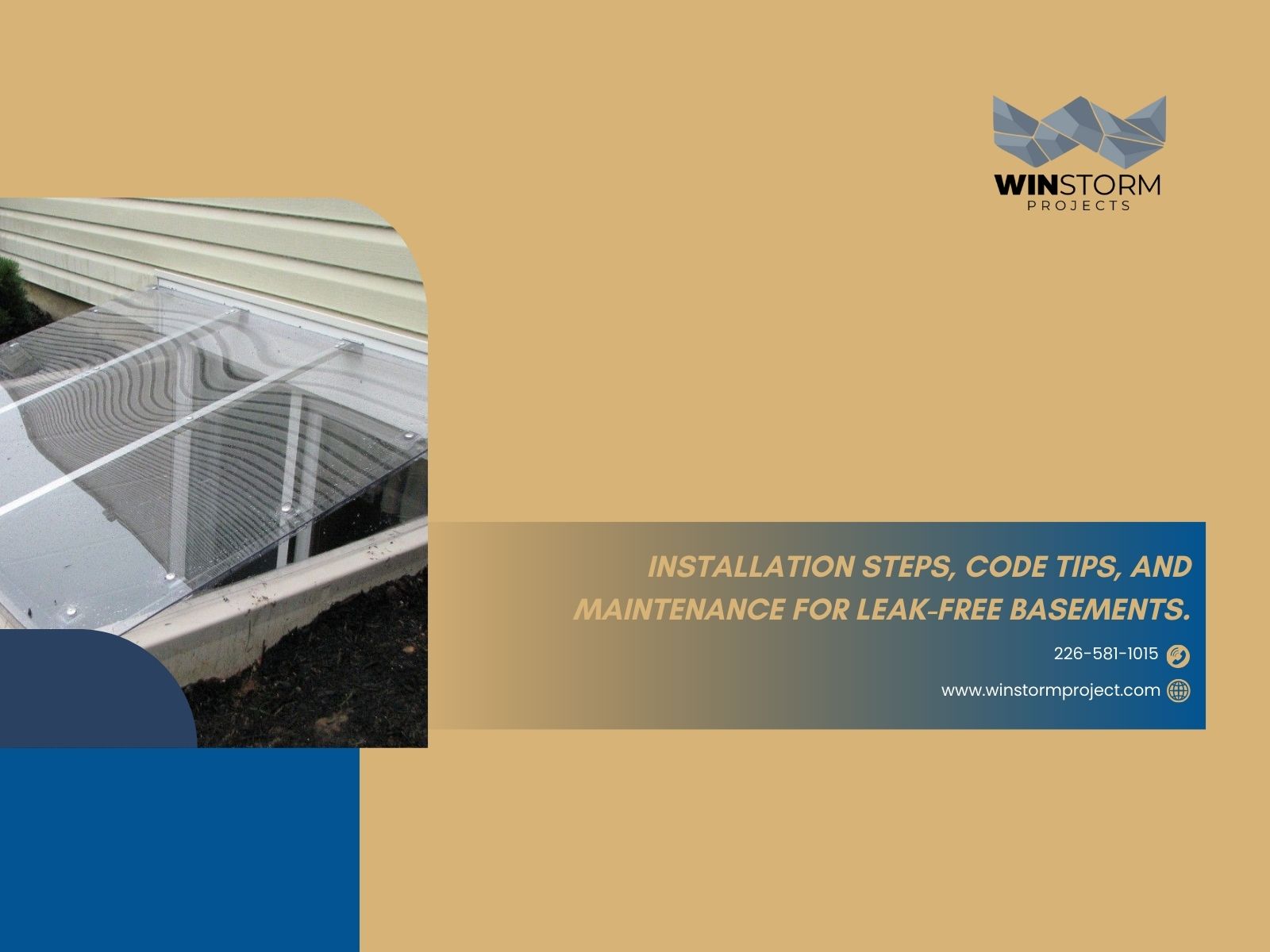Expert Guide to Window Wells for Durable and Dry Basements
Window wells are more than just a frame around your basement window. They keep soil, water, and debris away while allowing natural light and ventilation to enter your basement space. A properly installed basement window well plays a big role in keeping your basement dry and safe, while also improving the comfort and value of your home.
For homeowners in Ontario, where heavy rain and clay soil can put pressure on foundations, window wells and proper drainage systems help prevent basement flooding and water damage to your basement walls. Adding the right window well supply, covers, and drainage is one of the smartest ways to protect your basement.
Why Window Wells Matter for Your Foundation
Window wells provide more than light. They protect your basement window from water, soil erosion, and excess pressure. Without them, water can pool around window frames, increasing the risk of leaks and basement water issues.
Well-built basement window wells also support the surrounding soil, reducing pressure against the foundation. This helps prevent cracks and ensures your basement stays clean and dry.
Preventing Basement Water Damage with Proper Drainage
Drainage is the most important part of any window well installation. Without it, even the strongest well walls can fail. Signs of poor drainage include:
- Rusted or corroded metal window wells
- Standing water around the basement window
- Mould growth or musty smells in the basement space
A properly installed drainage system, often tied into a sump pump or weeping tile, prevents water from seeping into the basement. This gives homeowners peace of mind and reduces the risk of costly repairs.
How Window Well Drainage Systems Work
The drainage system around a window well usually includes gravel and a drain pipe. Gravel allows water to filter down while preventing clogs, and the pipe directs the water away from the foundation.
When connected to a sump pump system or weeping tile, this setup can keep your basement dry during heavy rainfall or snowmelt. For long-term performance, make sure the drainage is sloped correctly and that your sump pump installation is maintained.
Sealing Around Window Wells
Sealing around basement window wells is just as important as drainage. Waterproof membranes, flashing, and quality caulking help prevent water from seeping through gaps.
Poor sealing leads to problems like moisture buildup, cold drafts, and water damage to your basement. A proper seal not only keeps your basement dry but also improves energy efficiency by adding an extra layer of insulation around basement windows.
Choosing the Right Window Well Materials
Different materials have different advantages. Here’s a quick comparison of common types:
- Steel Window Wells – Durable and long-lasting, especially when coated to prevent rust.
- Concrete Window Wells – Heavy-duty option with strength against soil pressure, but must be sealed to avoid cracks.
- Stone Window Wells – Offer a natural look, though they require careful drainage to prevent water from pooling around them.
- Wood Window Wells – Affordable but require frequent maintenance to protect against rot.
Steel and concrete are the best options for Ontario’s climate because they can handle freeze-thaw cycles and heavy rainfall. A quality window well with proper sealing can reduce the risk of water damage to your basement.
Custom and Egress Window Wells

Custom basement window wells can be designed to fit your home’s needs. They make your basement more livable by allowing natural light and ventilation, and when paired with basement window well covers, they also keep out debris and pests.
Egress window wells are required by local building code for basement bedrooms or living areas. They provide a safe exit during emergencies while improving basement ventilation and allowing natural light to enter your basement. These must be properly sized, installed with drainage, and often paired with clear polycarbonate covers or metal grate covers to meet safety requirements.
Signs You Need a Window Well Replacement

Installing window wells has several advantages:
- Prevent basement flooding and water damage
- Allowing natural light into the basement
- Improve basement ventilation and comfort
- Protect your home’s foundation from pressure and erosion
- Add energy efficiency when paired with high-quality window well covers
With the right materials, drainage system, and proper installation, window wells provide long-term protection for your basement and foundation.
Conclusion: Keep Your Basement Dry and Safe
A clean and dry basement starts with quality window wells. From choosing the right materials to ensuring proper installation and sealing, these structures are key to keeping water from seeping into your basement.
At WinStorm Projects, we offer window well supply, installation, and replacement services across Guelph, Kitchener, Waterloo, Fergus, and nearby areas. Our team installs metal window wells, concrete, and custom options, all designed with drainage systems that work. We also provide high-quality window well covers, including clear polycarbonate covers and mesh covers, to add an extra layer of protection.
If you’re looking to protect your basement, improve energy efficiency, and prevent water from pooling around your foundation, we can help. Contact us today to request an inspection or quote and see the advantages of window wells done right.
Frequently Asked Questions
What is a window well?
A window well is a semicircular or rectangular structure installed around a basement window. It keeps soil and water away while allowing natural light and ventilation into your basement space.
Do window wells have to meet building codes?
Yes. In Ontario, the local building code requires egress window wells for certain basement windows. They must be large enough for safe escape and include a drainage system to prevent basement flooding.
Are window wells a good idea?
Yes. Window wells provide several benefits: they prevent water damage to your basement, improve basement ventilation, and make your basement more comfortable.
What materials work best?
Steel and concrete are the most durable. Stone and wood can work, but often need more maintenance. For Ontario’s weather, steel and concrete window wells are the better choice.
Do I need a window well cover?
A window well cover, especially polycarbonate or mesh covers, helps keep debris, water, and pests out. Clear polycarbonate covers also allow natural light while keeping your basement dry.
How often should I inspect my window wells?
At least once a year. Look for rust, water pooling, or loose structures. Early action can protect your basement from costly damage.
What are the signs my window wells need replacing?
Corrosion, water damage to your basement, mould growth, or unstable well walls are clear signs you need replacement.

